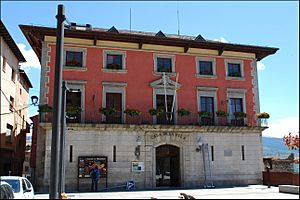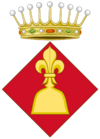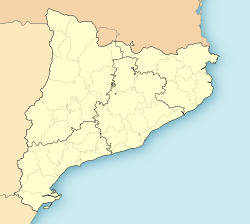Puigcerdà facts for kids
Quick facts for kids
Puigcerdà
|
|||
|---|---|---|---|
|
Municipality
|
|||

Casa de la Vila, the city hall
|
|||
|
|||
| Country | |||
| Autonomous community | |||
| Province | Girona | ||
| Comarca | Baixa Cerdanya | ||
| Area | |||
| • Total | 18.9 km2 (7.3 sq mi) | ||
| Elevation | 1,202 m (3,944 ft) | ||
| Population
(2018)
|
|||
| • Total | 8,981 | ||
| • Density | 475.2/km2 (1,231/sq mi) | ||
| Demonym(s) | Puigcerdanenc | ||
| Time zone | UTC+1 (CET) | ||
| • Summer (DST) | UTC+2 (CEST) | ||
| Climate | Cfb | ||
Puigcerdà is a town in northern Spain. It is the main town of the Cerdanya region in Catalonia. Puigcerdà is located in the province of Girona. It is close to the Segre River and right on the border with France. The French town of Bourg-Madame is directly next to it.
Contents
History of Puigcerdà
Puigcerdà is built near an old settlement from the Ceretani people. This ancient town later became part of the Roman Empire. The Romans called it Julia Libyca, which is now the town of Llívia.
Founding of the Town
Puigcerdà was officially started in 1178. It was founded by King Alfonso I of Aragon, who was also the Count of Barcelona. In 1178, Puigcerdà took over from a village called Hix as the capital of the Cerdanya region. Hix is now a small village in the French part of Cerdanya, near Bourg-Madame.
Wars and Changes
During a war between France and the Netherlands (1672-1678), French soldiers captured Puigcerdà. This happened near the end of the war. However, the town was given back to Spain as part of the Treaties of Nijmegen.
Puigcerdà had a special role during the Spanish Civil War. It was unique because it had a local government that was chosen by the people. This council was made up of Anarchists.
Modern Connections
In 1929, a railway line opened that connected Portet-Saint-Simon to Puigcerdà. This railway crosses the Pyrenees mountains into France. It helped connect the town to other places.
Main Sights to See
Puigcerdà has several interesting historical places and attractions:
- Puigcerdà Pool: A place for swimming and recreation.
- Torre del Campanar: This is a bell tower from the 12th century. It is the only part left of a church that was destroyed in 1936.
- Romanesque church of Sant Tomàs de Ventajola: This church is very old, known since the year 958. It is built in the Romanesque style.
- Romanesque church of Sant Andreu Vilallobent: This church dates back to the 10th century. It has been repaired and restored over time.
- Convent of St. Dominic: This religious building was started in 1291 and finished in the 15th century.
- Old Hospital: Built in 1190, this building shows a mix of Romanesque and Gothic styles.
Notable People from Puigcerdà
Many interesting people have come from Puigcerdà:
- Pere Borrell del Caso (1835-1910): A famous painter.
- Gemma Arró Ribot (born 1980): A skilled ski mountaineer.
- José Antonio Hermida (born 1978): A World Champion in Cross Country Mountain biking in 2010.
See also
 In Spanish: Puigcerdá para niños
In Spanish: Puigcerdá para niños
 | William L. Dawson |
 | W. E. B. Du Bois |
 | Harry Belafonte |





